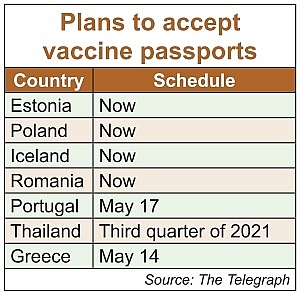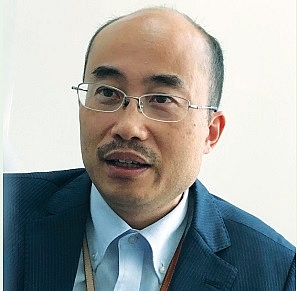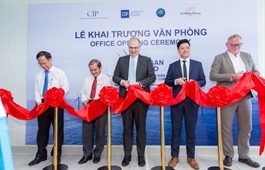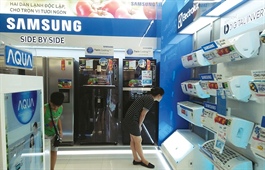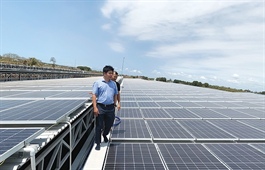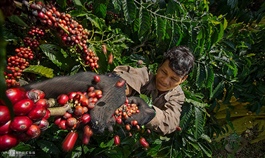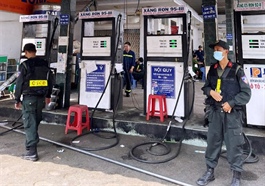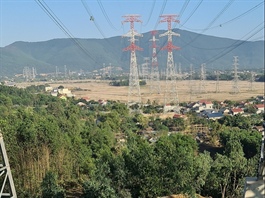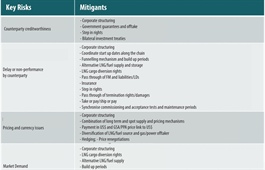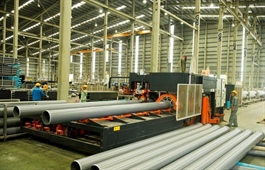Industries bet on vaccine visa measures
Industries bet on vaccine visa measures
In line with the global vaccine visa drive, Vietnam’s latest move to complete technical infrastructure for the availability of such a travel document in April is expected to revive industries, heralding strong economic recovery ahead.
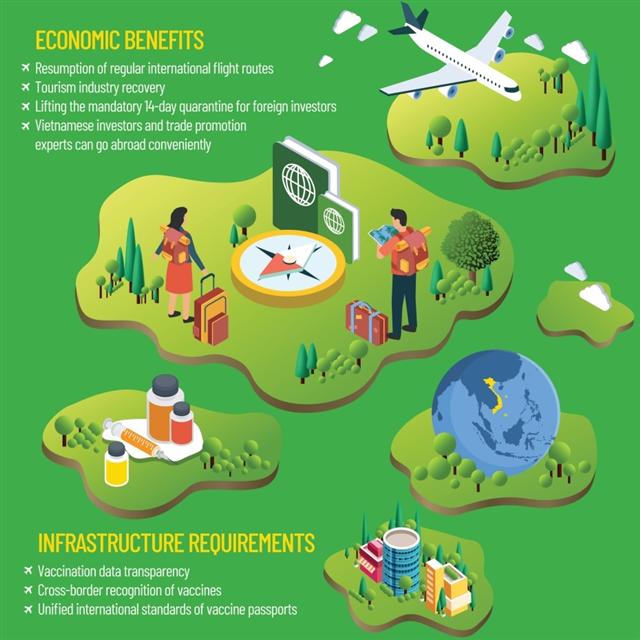
Opening up consistent flights is vital to Vietnam in terms of investment, tourism, and other areas
|
Vietnam Ocean Shipping JSC (Vosco) has been working to grasp the new and potential opportunities based on the recovering signals of the international shipping market.
According to Bui Viet Hoai, chairman of the company, in recent days the carriage on the Vietnam-Philippines route has risen to $16-17 per tonne for cement, and $9-12 per tonne for clinker on the Vietnam-China route. Moreover, the ship charter market is bustling again as charter fees of a 50,000 deadweight-tonnage vessel rose from $4,000-4,500 per day in May 2020 to $15,000-17,000.
Vosco has been facing the most difficulties in the company’s 50-year history, partly because of the ongoing coronavirus pandemic. Prices for the routes to the Philippines and China fell dramatically in 2020, with cement even dropping to $7 per tonne from $11, and clinker falling from $9-10 per tonne to $5-7.
“Our income was not enough to cover expenditures, and our company incurred losses of over $8.13 million in 2020, compared to a profit of $2.13 million in 2019,” Hoai admitted.
Hoai admitted that other shipping firms like Vosco are facing the same challenges. “The biggest hurdle is the lack of human resources. But to cope with this issue, they have to travel around the world, and there are no favourable travel conditions yet.”
Long-awaited lifebuoy
Hoai proposed that the government should allow ship crews to be among the prioritised groups for COVID-19 vaccination and receive vaccine visas, so as to further facilitate their travelling moving forward.
It is forecast that the global economy could grow by 4.5 per cent this year, thus increasing demands for transportation and logistics, and with that the need for cargo ships is predicted to rise by 30-40 per cent.
And like the shipping industry, other sectors like trade, tourism, investment are waiting for fresh air to recover. Vaccine visas are thus appearing as a good scheme to accelerate their facilitation.
For instance, tourism is evidently one industry that seeks the creation of a suitable visa for the new normal. Hoang Huu Loc, chairman of the Ho Chi Minh City Travel Association said, “The recognition of vaccine visas between countries is urgently important because it will facilitate Vietnamese tourists to travel to countries like before. If passed, we believe that this solution will facilitate a recovery of the entire tourism sector worldwide.”
In the wake of this, the Khanh Hoa Tourism Association, for instance, is preparing to welcome tourists with vaccine visa in May when it is hoped Vietnam can permit entry for foreigners with such a pass. Khanh Hoa and particularly the famous tourist city of Nha Trang, has been popular with both Russian tourists and expatriates in recent years.
Elsewhere, foreign direct investment (FDI) attraction is also foreseen to benefit from vaccine visas. Vietnam experienced a challenging year in FDI attraction during 2020 as it lured just $28.53 billion in registered FDI, equal to 75 per cent of 2019. While there have been some positive signals, the country’s registered FDI in the first two months of 2021 still fell 15.6 per cent on-year.
The Ministry of Planning and Investment’s Foreign Investment Agency blamed the situation on the global health crisis which has been continuing to limit travelling and thus decisions for new investment projects. International businesses are waiting for the vaccine visa and the resumption of international flights to make their next steps after months of delays.
Pipeline readiness
|
At present, some countries already issue vaccine visas like China, and Thailand has also announced its plan for vaccine visa. In the EU, plans are in place to unveil vaccine visa to enable summer travel.
At the March 19 meeting of the Steering Committee for COVID-19 Prevention and Control, Minister of Health Nguyen Thanh Long said that Vietnam is working with countries on specific policies on vaccine visas.
The minister clarified that the visa would be a certificate given after two shots of COVID-19 vaccine aligned with international health quarantine regulations, which prevents holders from being kept in quarantine or to take COVID-19 tests.
Relevant ministries and telecoms operators said for foreigners entering Vietnam, technical infrastructure will be completed and available for use in April.
The Ministry of Health (MoH) is also working with countries on the possibility of applying vaccine visa via QR codes.
Assoc. Prof. Dr. Tran Dac Phu, senior advisor to the Vietnam Public Health Emergency Operation Centre, said that the technical infrastructure for the vaccine visa is a software system and a website to confirm the information of people on entry including conditions eligible for entry, kinds of valid vaccines, and countries and regions eligible for entry.
For locals, the performance of vaccine visa will be based on health insurance numbers and ID cards. When someone has already received two shots, the information system will update this in the respective QR code.
“When vaccinated, people have to download electronic records on the Apple Store or Google Play. Health units will use the QR code and can access information about the used vaccine, vaccination terms, screenings, vaccination history, and others,” said Minister Long.
At present, the MoH and Viettel are piloting this at national health units where COVID-19 vaccinations are taking place to assess capacities in an effort to make everything ready and available in April.
|
Nicolas Audier - Chairman, European Chamber of Commerce in Vietnam
Vietnam’s strict border controls are one of the reasons behind the government’s world-leading handling of COVID-19. Effective quarantine measures have kept people safe and allowed domestic business to continue operating at levels not seen in most other markets. Countries around the world are now hoping that the vaccine roll-out will help to open borders and economies as more people are inoculated against the virus. This will be important for those sectors most impacted – such as tourism and aviation – as well as for other industries which depend on the free flow of goods, people, and services. The challenge now will be to ensure that whatever measures are put in place can protect health while also helping to kick-start economic growth and job creation in these hard-hit sectors. A vaccine passport – if implemented – will be a positive step but not a silver bullet. It will not solve this problem alone. Nor will tourists and business-travellers be able to return to their previous levels overnight. Success will depend on the number of vaccinations delivered in major in-bound business and tourist markets, such as the European Union. In particular, since older and more vulnerable people are being prioritised for immunisation, it could take some time for the vaccinations to reach those likelier to travel. The EU is discussing a scheme to enable citizens to move between its 27 member states. It hopes that this so-called ‘green certificate’ will be implemented in time for the European summer tourist season. But, at this stage, this is still under discussion and we do not know what form the final system might take. In terms of travel outside the EU, one of the crucial considerations for all countries will be to achieve international consensus so that we can ensure reciprocal access for our citizens. Once such a passport is operational, we hope it will ease the travel of EU citizens to Vietnam so that European businesses can continue to contribute to this country’s economic growth and prosperity. Adam Sitkoff - Executive director, American Chamber of Commerce Hanoi
Around 500 million doses of the COVID-19 vaccine have already been administered worldwide. This number rises each day and many countries are evaluating plans to reopen borders later this year. Many people say documentation that proves vaccination could create a bright future for post-pandemic travel, but others worry about fraud, privacy, and discrimination. Less burdensome entry procedures will facilitate travel for businesspeople, foreign experts, and tourists. In addition, in-bound travel is necessary to facilitate new investment, efficient operations, key infrastructure, education, and more. That is why we encourage the government to consider a gradual opening to quarantine-free arrival in Vietnam, in line with international best practices and safety. This will likely require proof of vaccine and a negative coronavirus test result. Proving you are vaccinated to travel is not a new concept, but doing so for COVID-19 would be on a far greater scale than ever before. Regardless of the challenges, Vietnamese policymakers need to think seriously about a safe and simple system of documentation that will facilitate international arrivals here. There are many issues to consider on how a vaccine passport would work, which apps would be accepted, minimising the risk of fraud, protecting privacy, and general implementation of the system. In the United States, the government has not yet issued guidance on management of vaccinated people during travel, and there are no established international standards for documenting vaccinated people. Vietnamese authorities do not have to decide everything today. They do, however, need to be looking at likely best practices so they can be ready when the time comes for action. The health and safety of people in Vietnam should remain the government’s number one priority. At the same time, a more “normal” world is coming, and a system that demonstrates proof of vaccination plus pre-flight and arrival tests should allow for safe, quarantine-free entry in Vietnam and everywhere else. Marko Walde - Chief representative, Delegation of German Industry and Commerce in Vietnam
The European Commission wants to issue a certificate, the so-called digital green pass, that would allow people who have been vaccinated to travel and move more freely. The aim is to gradually enable them to move safely in the European Union and abroad for work or tourism. This means that, in theory, people will gain unrestricted access to flights, restaurants, bars, tourist attractions, and festivals. It also means quarantine protocols, like isolations for up to 14 days in a hotel, can be avoided. The plan would be rolled out later this March, and it is expected to take at least three months to set up a viable system, both technically and logistically. The pass will be free, bilingual in the language of the issuing member state and English, secure, non-discriminatory, and available in digital or paper formats, both of which will have QR codes. The digital green pass will comprise three different certificates: vaccination certificates, which state which brand of the vaccine was used, the date and place of inoculation, and the number of doses administered; negative test certificates; and medical certificates for people who have recovered from COVID-19 in the last 180 days. As the vaccination roll-out accelerates around the world, vaccine passports can enable vaccinated citizens to travel and visit public places. But before vaccine certificates or passports are introduced, a large amount of the population would need to be vaccinated and a larger group of individuals would need to have access. For Europe, the current plans seem to be that around 70 per cent of the EU population are to be vaccinated by the end of the summer. In addition to easing the entrance for foreigners and based on the current situation of the pandemic worldwide, the Vietnamese government should also consider opening more international flights especially for foreigners and supporting work visa for those who wish to stay and work in Vietnam for a long time. The Vietnamese government lately approved charter flights organised by the AHK Vietnam bringing foreign experts, investors, diplomats, and their families from Europe to Vietnam this year. Furthermore, the government should support well-organised immigration procedures to facilitate the legal entry of investors, managers, technical experts, diplomats, and their family members. Moreover, trialling digital vaccine passports would be an essential criterion which allows authorities to quickly check whether travellers have been vaccinated and with which vaccination. This would not only support the recovery of the tourism sector but also increase Vietnam’s attractiveness. The most important thing is how we can set up a viable system, both technically and logistically. Vietnam should also work on a verification software to ensure that the approach is seamless across all countries and in line with other systems in the world. Hirai Shinji - Chief representative, Japan External Trade Organization Ho Chi Minh City
At present, because of the regulations to prevent the spread of COVID -19, businesspeople coming to Vietnam will have to go through quarantine for 14 days. Discussions are taking place on whether that period should be shortened if people present evidence of being vaccinated. While I wish that businesspeople could travel without being worried about the virus, the discussion on vaccine passports should take into account several issues. Firstly it must be determined how long a vaccine can be effective for. Since injections started only recently, we have not got enough accumulation of scientific knowledge and medical experience on how long the vaccine will prevent people from contracting COVID -19 and its variants. Secondly, it is believed that vaccinated people will never transmit the infection to other people. However, community immunity will need to be achieved. Perhaps he or she might not be infected, but that does not guarantee that other people in contact with him or her will be completely free from infection. Thirdly, currently expatriates living in Vietnam are not sure when they will be able to get the vaccine in Vietnam, or in their home countries. If businesspeople with a vaccine passport are treated favourably when they enter the country, what kind of requirements will they have to satisfy if they want to stay in Vietnam? I expect the Vietnamese government, having kept COVID-19 under control for the past year, will find practical and effective solutions. |


